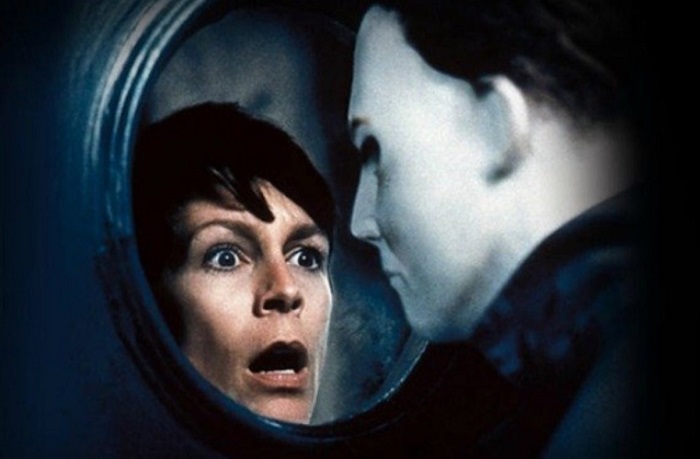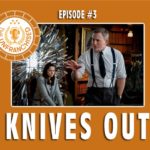
Welcome to Then and Now, a recurring column where one of us revisits a movie we haven't seen in a long, long time and then writes about how the film's effect on us today differs from the place it holds in our memory.
The movie: Halloween H20: Twenty Years Later (d. Steve Miner, 1998)
When I last watched it: January 2, 1999. I only remember that because it was the tail end of an extended Christmas vacation. I was 11 and had started to jump into deeper genre waters. I'd watched the Die Hard and Terminator movies for the first time and conquered my fear of horror films. Sure, it was just the original Halloween and the Scream movies, but it got me on the road. I was staying over a friend's house. He was a massive horror fan who'd already burned through viewings theatrically and the VHS he rented. I had not seen any of the sequels. This was the first one that I saw.
What I remember pre-rewatch: HYPE. That's my strongest memory of Halloween H20. All I remember about the film itself were isolated bits: the Scream-esque opening sequence, Adam Arkin's brutal murder, Janet Leigh's cameo, Michael's decapitation. I enjoyed it, but knew, even then, that the original did it better. What I remember a lot clearer was the pre-release buzz about the writer of Scream wiping out the bad taste of the franchise by reuniting Jamie Lee Curtis with Michael Myers.
Allow me to explain: in 1998, getting Curtis back to reprise her role as Laurie Strode was something of a miracle. Since 1981's Halloween II, Curtis had established herself as a versatile leading woman, distancing herself from horror (Kathryn Bigelow's underrated slasher noir Blue Steel notwithstanding). Trading Places, A Fish Called Wanda and the sitcom Anything But Love cemented her comedic talents in the 80's and 90's. Shortly before H20, she generated deserved Oscar buzz for stealing Arnold Schwarzenegger's mojo in True Lies. Despite a Golden Globe win and a Screen Actors Guild nod, she failed to garner a nomination at the David Letterman Hollywood Olympics. In a decade defined by irony, the idea of Curtis returning to the Halloween franchise wasn't just a talking point in Fangoria. This was a pop culture event for the folks at Entertainment Weekly and E! that would liven up the summer movie season.
Post-rewatch thoughts: Empty calories — the kind you regret after impromptu Wendy's. Comparisons to David Gordon Green's triumphant Halloween continuity-obliterating relaunch are inevitable, and the movie in theaters now does a much better job balancing and executing the dread and humor. In H20, Laurie Strode has distanced herself from her trauma, but maintains a shaky relationship with her son. Despite her success as a career woman, she remains haunted by the darkness of her youth. Laurie must dig up her nerves of steel to confront her past on a pivotal anniversary.
I'm not sure if Kevin Williamson had Final Draft on his Compaq desktop in the late 90s, but from the first frame, H20 has the stench of being typed over a template for a Scream sequel. Worse yet, while Williamson conceived the story (and has a co-executive producer credit on the film), it's Dimension Films toadie Matt Greenberg and Robert Zappia, a sitcom writer with no horror experience, who penned the shooting script.
Zappia and Greenberg go to extremes to replicate Williamson's Scream success to disastrous results. Every other bit of dialogue is some kind of one-liner poetry slam. Unlike Scream, said levity tries too hard. Scream signatures like the famous opening victim (in this case, 3rd Rock from the Sun's Joseph Gordon-Levitt), extensive high school intrigue, and relentless knife murder are accounted for. Worse is its double-down on the fake-outs, sarcasm and meta humor that made the Scream franchise even more unique.
You can hear these two saying "I'm so clever!" at the thought of casting Janet Leigh as her daughter's secretary or putting Scream 2 on a TV. H20 gets to an annoying fever pitch quickly in its lean 86-minute run time. The surprisingly ineffectual direction by horror stalwart Steve Miner leaves its characters — including Curtis — either listless presences or inevitable victims. For example, LL Cool J, as a local cop who would rather write erotica, could have been excised from the film to no consequence. Even when Laurie and Michael have their climactic showdown, H20 has drowned (no pun intended) in self-indulgence, leaving no punch.
The only justification for its existence is that the Weinsteins wanted to ramp up their market share in horror. They realized that the 20th anniversary of Halloween was coming, saw dollar signs and cut Jamie Lee Curtis a seven-figure paycheck to cover an island vacation home. That's it. H20 came about because of rose-colored glasses. Its only virtue is John Ottman's score, eschewing iconic synthesizer beats for a mainstream orchestral composition that evokes Danny Elfman.
Barring the abysmal Halloween 5: The Revenge of Michael Myers, H20 was the worst Halloween to date when it was released. 4 is better. The Curse of Michael Myers is better, albeit in its involving and then-unavailable Producer's Cut variety. Nevertheless, Rob Zombie had yet to transition his love of horror films from music to filmmaking. I think all of us would rather not carry on that discussion.











